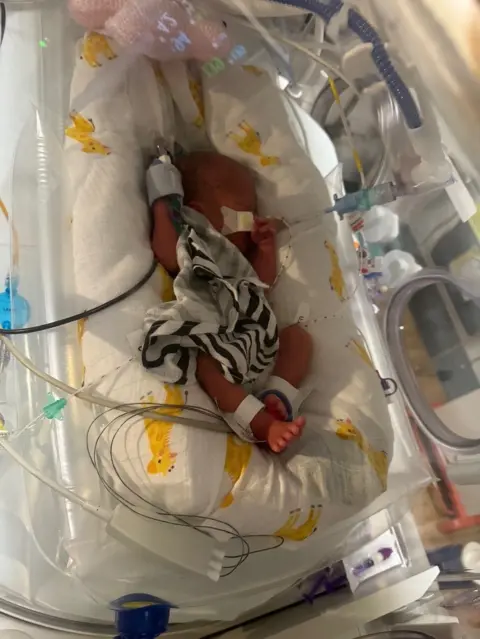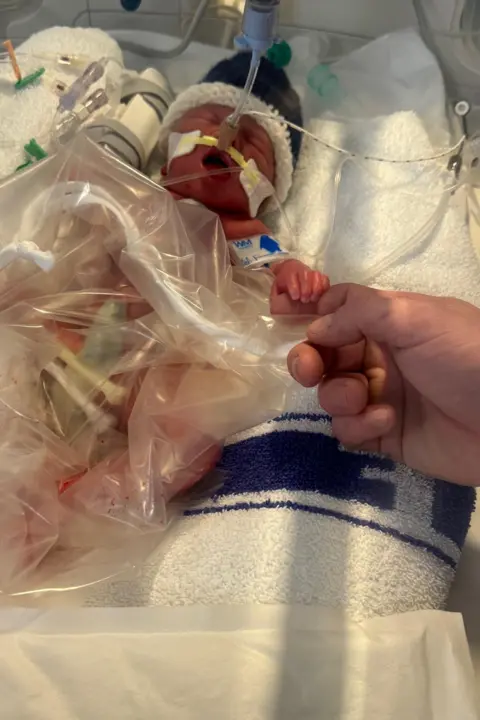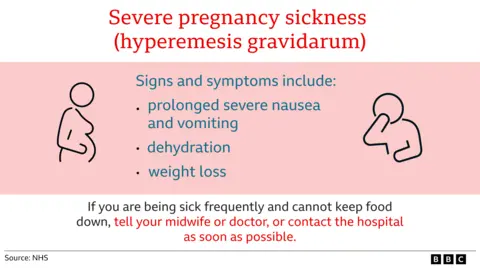 Atlanta Mcintyre
Atlanta McintyreA woman who was placed in an induced coma after experiencing severe pregnancy sickness has described waking to find her baby had been born.
Atlanta McIntyre, 29, from Llantrisant in Rhondda Cynon Taf, had excessive nausea and vomiting during her pregnancy, known as hyperemesis gravidarum (HG).
During one episode of vomiting, Ms McIntyre choked and had to be put into an induced coma by doctors.
When she regained consciousness, she discovered that her daughter had been delivered by caesarean section.
“I was very shocked and in disbelief,” said Ms McIntyre.
“I remember telling all the nurses and my partner that they were lying to me about having had her.”
Sickness in pregnancy, often called morning sickness, is very common, with eight out of 10 pregnant women experiencing symptoms.
But some pregnant women experience extreme vomiting and nausea, known as HG, which often needs hospital treatment.
According to the NHS, HG affects about one to three in every 100 pregnant women.
“My sickness started early on – from the second I knew I was pregnant, before I even took a test,” Ms McIntyre said.
“Around about six weeks, the morning sickness really kicked in. Every morning, I was up being sick. Everything I ate, I was being sick.”
The sickness became so severe that Ms McIntyre ended up needing repeated hospital treatment for dehydration.
 Atlanta Mcintyre
Atlanta Mcintyre“I couldn’t keep anything down. I couldn’t keep medication down or anything like that.
“People kept telling me ‘It’ll get better after the first trimester’ so, after 12 weeks, it’ll get better.
“I hit around 14 weeks, and it was still weirdly severe to the point that I couldn’t keep liquids down.
“That’s when they diagnosed me with HG.
“I was back and forth weekly, especially towards the end of my pregnancy, it was daily that I was back and forth to the hospital,” Ms McIntyre added.
In February 2024, during her 29th week of pregnancy, Ms McIntyre started being sick while eating.
“I basically choked on [the vomit] and it went straight onto my lungs,” said Ms McIntyre.
 Atlanta Mcintyre
Atlanta McintyreMs McIntyre became so ill that doctors at Prince Charles Hospital, in Merthyr Tydfil, had to put her into an induced coma on 19 February.
“I was in that for a good 20 hours before they did a caesarean section,” she said.
“Her [the baby’s] heart rate dropped drastically, and they said to my partner: ‘It’s time – we have to get her out now, otherwise she won’t make it’.”
Ms McIntyre’s daughter, Poppy, was delivered prematurely at 29 weeks on 20 February, weighing 3lb (1.4kg).
 Atlanta Mcintyre
Atlanta McintyreThe baby was transferred to Singleton Hospital in Swansea to be cared for.
When Ms McIntyre awoke from her coma three days later, she described feeling terrified.
“It was terrifying – not knowing whether [Poppy] was OK,” said Ms McIntyre.
“She was intubated and ventilated at the time, and was in a completely different hospital to me.”
 Atlanta Mcintyre
Atlanta McintyreMs McIntyre’s partner had been visiting her during the daytime before heading to Singleton to spend time with their daughter in the evening.
About 10 days after waking from her coma, Ms McIntyre met her daughter for the first time.
“It was really scary for us, but it was amazing to see her and see how she had progressed just in those few days where I wasn’t around,” said Ms McIntyre.
Now, at 10 months old, Poppy is living at home and doing well.
What is hyperemesis gravidarum (HG)?

- Hyperemesis gravidarum (HG) is different from morning sickness, which affects about 80% of pregnant women
- Morning sickness causes nausea and vomiting which usually improves by the 16th or 20th week of pregnancy
- By contrast, women with HG can vomit more than 50 times a day and feel constantly and severely nauseous, significantly interfering with their daily lives
- Complications of HG can include serious vitamin deficiency from the excessive vomiting, significant weight loss, dehydration and malnutrition, putting the health of both mother and baby at risk
Ms McIntyre hopes that by speaking about her experience of HG, she can encourage other pregnant women experiencing the condition to seek help.
“I would say to other women – it’s not normal to feel like this,” she said.
“Don’t be pushed aside and be told it’s just morning sickness… I was pretty much like the walking dead.
“I was dizzy, I was lethargic, I couldn’t lift my head up, I had constant headaches, I was constantly dehydrated.
“I couldn’t keep liquids down. Anything I smelt would set me off. I couldn’t eat greasy foods or anything like that. I could only eat bland food – rice, bread, ginger nut biscuits. That’s when it got really bad, when I couldn’t even keep that down.
“I did lose a lot of weight during my pregnancy. The fact that she was born three pounds amazes me.”



